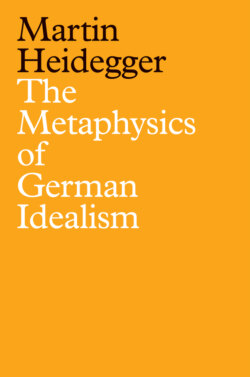Читать книгу The Metaphysics of German Idealism - Martin Heidegger - Страница 6
Introduction: The Necessity of a Historical Thinking § 1 Schelling’s Treatise as the Peak of the Metaphysics of German Idealism
ОглавлениеAccording to the announcement,1 we will deal with the Metaphysics of German Idealism here. We shall attempt to do so by way of an interpretation of Schelling’s “Freedom Treatise.” We have thus singled out an isolated writing of one single thinker from this epoch. This procedure is in order if we generally limit ourselves to learning about only this text of this thinker, thereby becoming familiar with a limited sphere of the thinking of German Idealism. Yet this procedure becomes questionable as soon as there lurks in the background the claim to think through, by way of such a path, “the metaphysics of German Idealism as such.” This claim will guide us nevertheless.
But then the intended one-sided approach requires a particular justification. How else should this be accomplished than by a knowledge of what is thought in this isolated treatise by Schelling? In this, we already presuppose that this isolated treatise reaches the peak of the metaphysics of German Idealism. However, the earliest we can discern this is at the end of a completed interpretation, or perhaps even only after a manifold interpretation.
When is it the case that this apparently isolated and arbitrary path is justified and even necessary?
1. If Schelling’s treatise is the peak of the metaphysics of German Idealism.
2. If all the essential determinations of this metaphysics are borne out in this treatise.
3. If, at all, the essential core of all Western metaphysics is able to be exposed in complete determinacy on the basis of this treatise.
2
The procedure therefore remains violent, at least at the beginning. Put more precisely: the procedure always appears violent to the commonplace opinion that only the frequently mentioned “historiographic completeness” provides the guarantee for the knowledge of history. But perhaps this opinion is only an opinion, an assumption that is ungrounded, or poorly grounded, or even altogether ungroundable in terms of the essence of history. Perhaps that is so. In order to raise this conjecture to the level of certainty and, in this way, to justify our undertaking, we would admittedly have to engage in a consideration whose extensive scope and difficulty hardly take a back seat to an interpretation of the selected treatise. For it would have to be shown that, and in what way, the historicality of the history of thinking is unique, that this history can, to be sure, look like historiographic reflection, but in truth has, rather, an essence of its own and also does not coincide with what one in this field otherwise tends to oppose to historiographic presentation, namely, “systematic” reflection.
These brief indications already make clear that, at the beginning, our undertaking remains surrounded by a tangle of different sorts of misgivings and all too easily misleads one to untangle and iron them all out prior to the proper work, thereby deferring, however, the proper work of interpretation time and again. In order to avoid this danger, there is evidently only one good way out, namely, to begin blindly with the elucidation of Schelling’s treatise and to trust that some benefit will come of it.
